News
22.01.2013
Deutsche Bank: Speculating with Food “in the interest of clients”

On Saturday, Deutsche Bank - Europe’s largest bank in terms of assets - announced it would continue trading in agricultural-based financial products, products which food campaigners blame for rising food prices. In a panel discussion at the Global Forum for Food and Agriculture in Berlin, Deutsche Bank Co-Chief Executive Jürgen Fitschen said an internal review had found no convincing proof that food-based financial instruments led to greater food price volatility. “Deutsche Bank has therefore decided in the interest of its clients that it will continue to offer financial instruments linked to agricultural products,” Fitschen said. With this move, the bank lifted the moratorium on trading new commodities products introduced by former Deutsche Bank CEO Josef Ackermann in March 2012. The announcement drew fierce criticism from non-governmental organisations. “The biggest losers will be the poorest people on low income. They will be facing even more volatile and higher food prices”, said Heidi Chow, a campaigner with World Development Movement (WDM), a British anti-poverty group. WDM research found that total assets of financial speculators in commodity markets increased from 65 billion US dollars in 2006 to 126 billion in 2011, leading to soaring food prices and pushing 44 million people into extreme poverty in the last six months of 2010 alone. Thilo Bode, director of the German consumer group Foodwatch, described the bank’s decision as highly irresponsible. “There are sufficient scientific findings and practical evidence that the financial products Deutsche Bank is selling lead to speculative price bubbles on the future market for agricultural raw materials and therefore can cause famines,” Bode told Reuters.
20.12.2012
Cameroon: Palm Oil Plantation threatens Local Livelihoods
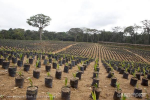
Campaigners will continue their protest against a large palm oil plantation which is threatening a rainforest in southwest Cameroon, as well as the livelihoods of thousands of people living in the area. This is the announcement made by Nasako Besingi, director of the local NGO ‘Struggle to Economize the Future’, in an interview published today by Inter Press Service. In 2009, SG Sustainable Oils Cameroon (SGSOC) - a subsidary of the US-based agricultural company Herakles Farms - signed a 99-year lease contract with the Cameroonian Government over 73,000 hectares of land in the Korup National Park; an area rich in biodiversity. Without presidential approval and prior to an Environmental and Social Impact Assessment as required by law, SGSOC pressed ahead with the project, clearing forests and developing oil palm nurseries. “The plantation will economically displace approximately 25,000 people and put at risk many others who depend on that land for small-scale food production, hunting, and non-timber forest products”, Nasako Besingi warned. Local farmers cultivate millet, cocoa and cassava in the region. SGSOC promised the creation of jobs but campaigners fear that the social and environmental consequences will outweigh potential benefits. Brendan Schwartz, Programme Coordinator of Réseau de Lutte contre la Faim, a network of Cameroonian NGOs, criticised the government’s role: “While peasant farmers have numerous obstacles to titling their land and securing access to other natural resources on which they depend, multinational companies can fly into Yaoundé and sign deals to secure huge tracts of land with little regard for the communities in these areas.” An investigation published by the Oakland Institute and Greenpeace in September has denounced the human rights violations commited by SGSOC and warned against the irreversible negative impacts on the people living in the area and on the environment.
- IRIN Africa: Cameroon: Campaigners oppose industrial palm oil plantation
- Inter Press Service: Fighting to Save Africa's Richest Rainforest
- Massive Deforestation Portrayed as Sustainable Investment: The Deceit of Herakles Farms
- Action Alert: Stop Palm Oil Plantations from Destroying Africa's Ancient Rainforests
18.12.2012
Boosting Local Food Production by Linking Producers and Consumers
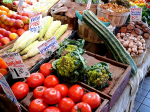
A new study published on Friday examines the state of local food production in western Washington and identifies ways to develop a food supply that is more local. The report ‘Planting the Seeds’ summarises the findings of the Western Washington Foodshed Study, a project carried out by the American Farmland Trust and the University of Washington from 2011-2012. According to the study, only 25% of the food consumed in western Washington is grown locally, with the rest coming predominantly from the Midwest and overseas. The study suggests that it could be possible to increase this amount to over 60% if four strategies were adopted: bringing land back into food production; increasing yields on active farmland (e.g. by applying improved practices for sustainable agriculture); cutting food waste; and changing people’s diets. The report also highlights several approaches to increase the availability of local food, such as reconnecting food producers and consumers through simpler supply chains. “Farmers markets and community-supported agriculture are a good start, as are grocery chains that specialise in local food sources,” said Dennis Canty, Pacific Northwest Director of American Farmland Trust. The authors also recommend eating more food which is grown seasonally. Local food systems support the economic viability of farmers and rural communities, avoid urban sprawl and guarantee a regular supply of delicious and healthy food, the study concludes.
13.12.2012
Multinationals to benefit from unified EU Patent Scheme, NGOs warn
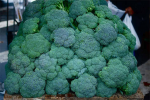
On Tuesday, the European Parliament approved a unified European patent scheme, which is intended to accelerate the granting of patents within the EU and make it less expensive for companies to file patents. Ahead of the vote, a coalition of civil society organisations - ‘No Patents on Seeds’ called for the rejection of the proposal. “Multinational companies like Monsanto are the most likely to profit from the Unitary Patent as a 'one stop shop' to gain fast track monopolies within the EU” said Christoph Then from the coordination of the coalition, warning that the adoption of the EU Unitary Patent would put the interests of the industry above those of consumers, farmers and traditional breeders. Up to now, it was necessary for companies to register their patents separately in each EU Member State at a cost of 36,000 euros, whereas patents under the new scheme will cost just 5,000 euros, according to the EU Commission. The new patent legislation also approved the establishment of a Unified Patent Court – another cause for concern for ‘No Patents on Seeds’. The legislation excludes the Court of Justice of the European Union (ECJ) from taking final decisions, meaning there will be no possibility of appealing to the ECJ against decisions taken by the Unified Patent Court. Furthermore, in comparison to procedures at the European Patent Office, the new court will mean higher litigation costs for NGOs who want to lodge an appeal in the public interest, for example against patents on life warned Christoph Then.
10.12.2012
Doha: Impact of Climate Change on Food Security neglected

As the United Nations Conference on Climate Change came to a close on Saturday, NGOs criticised the lack of commitment to address the disastrous impacts of climate change, especially with regard to food security. Michiel Schaeffer, a scientist at Climate Analytics, expressed surprise that very little emphasis had been placed on food security at the event: “There is no question climate change poses a major risk to our ability to produce food”, Schaeffer told IPS. He stressed that the current rise in the Earth's average temperature by 0.8 degrees Celsius had already led to droughts, flooding and extreme weather events linked to climate change. Celine Charveriat, Director of Campaigns and Advocacy at Oxfam International shared his concerns: “This year droughts in the Sahel, the US and Russia saw food prices rise and hunger spread, but rather than rising to the challenges posed by climate change, we saw a drought of climate action from rich countries in Doha.” The two-week round of talks ended with a final marathon session in which states extended the Kyoto Protocol to 2020. However, this will only apply to 15% of global greenhouse gas emissions as countries such as the US, Canada and Russia opted out. A roadmap for a new global climate treaty was also agreed. Set to come into force in 2020, it will require both developed and developing countries to cut their emissions. Critics were further disappointed by the lack of funding pledges. Developed countries had promised $100 billion per year from 2020 to help poor countries adapt to climate change. However, no funding was granted for the seven-year interim period. Only a few European countries made individual pledges. “Poor countries came to Doha facing a climate ‘fiscal cliff’, and at the end of these talks they are now left hanging by their fingertips off the edge”, Oxfam said.
06.12.2012
Declining Food Prices, Tight Cereal Stocks

According to the Food and Agriculture Organisation (FAO), global food prices decreased by 1.5% between October and November, and were on average 3% lower than in the same month in 2011. The FAO Food Price Index, published today, measures the monthly change in price of commodities such as cereals, dairy products and oilseed, using a point system. In November, food prices averaged 211 points. This is below the previous price peaks in June 2008 and February 2011, and the lowest figure since June 2012 when prices started to climb due to droughts in the US and the Black Sea region. In general, however, food prices remain at a high level, especially for grain: The FAO Cereal Price Index went down slightly to 256 points – but is still up 12% compared to November last year, and only 18 points below the record high of 274 points in April 2008. These figures largely match up with the World Bank’s Food Price Watch report which was published last week. “A new norm of high prices seems to be consolidating. Although we haven’t seen a food crisis such as the one of 2008, food security should remain a priority”, said Otaviano Canuto, the Bank’s Vice President for Poverty Reduction and Economic Management. The FAO also announced today that world cereal production is expected to decrease by 2.8% from last year’s record crop to an estimated 2282 million tonnes. These figures are lower than the forecasts published last month due to new estimates on maize harvests in the Ukraine and Russia, and reduced wheat prospects in Australia and Brazil. World cereal stocks could decline to 495 million tonnes, posing the danger of more volatile food prices. With lower stocks, any unexpected developments create more variability in the prices than would otherwise, Abdolreza Abbassian, a senior FAO economist told Reuters.
03.12.2012
Investors Encouraging Land Grabbing, NGOs warn

Ahead of a global farmland investment conference opening today in London, civil society organisations have called on major agricultural investors to stop facilitating the practice of land grabbing. In a joint press release, Friends of the Earth Europe, together with Anywaa Survival Organisation, GRAIN and Re: Common, urge the banks and pension funds attending the conference to ensure they do not invest in projects which threaten the food sovereignty of the local population. “Communities around the world are struggling to deal with the increasing land grabs. Many small-scale land holders have lost their sole source of income and the consequences for the environment are often disastrous. Yet, investors are gearing up to accelerate the grab of the world’s most fertile farmlands”, said Anne van Schaik, Accountable Finance Campaigner for Friends of the Earth Europe. At the Global AgInvesting Europe 2012 conference, taking place from 3 - 5 December, financial investors and pension funds will gather to explore investment opportunities in agriculture in Africa, Latin America and Russia. The event, attended and sponsored by agribusiness giants such as Bunge and Monsanto, brings together funds with more than USD3 trillion in assets. Earlier this year, Friends of the Earth Europe published the report ‘Farming Money’, which investigated the agricultural investment activities of 29 European banks and pension funds, including Deutsche Bank, Barclays and Allianz: It revealed their contribution to food speculation, as well as the direct or indirect financing of land grabs. Due to ongoing critique, some banks have recently removed agricultural products from their portfolios and committed to refraining from speculating on food prices.
28.11.2012
EU approves disputed Sustainable Palm Oil Scheme
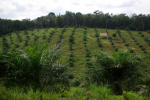
The European Commission has decided to recognise a certification scheme which will see biofuels produced from palm oil labelled as sustainable. The decision, made last Friday, comes despite recent studies by the Commission itself that have proved that the carbon footprint of palm oil biofuels is worse than that of conventional diesel. The approval of the scheme, proposed by the controversial multi-stakeholder initiative of palm oil producers, distributors and some NGOs – The Round Table for Sustainable Palm Oil (RSPO), means that palm oil suppliers will not be required to provide further evidence of compliance with EU sustainability criteria, and can qualify for subsidies. Greenpeace Forest Campaigner Sini Harkki has objected to the decision stating that “The Commission’s decision is disgraceful and smacks of hypocrisy. One day palm oil biodiesel is dirtier than normal diesel and the next day, after a little poking by the industry, the Commission swallows its own words”. Studies commissioned by the EU, including an impact assessment published in October, found that biofuel production can lead to a net increase in carbon dioxide emissions when indirect land use changes (ILUC) are considered. ILUC occur if forests are cleared or peatland is dried to meet the growing demand for biofuels, leading to the release of greenhouse gases. Palm oil biodiesel has the highest ILUC emissions of common biofuels. “Palm oil is driving deforestation, wildlife loss, community conflicts, and accelerating climate change. Instead of greenwashing palm oil, the EU should outright ban its use as a biofuel”, said Robbie Blake, biofuels campaigner for Friends of the Earth Europe (FoEE). Greenpeace and FoEE have called on the Commission to suspend the authorisation of the scheme until ILUC emissions are truly accounted for by law. Last month, the Commission proposed a reporting obligation on greenhouse gas emissions from ILUC. However, these factors carry no legal weight when determining whether biofuels meet EU green transport targets.
27.11.2012
Agriculture must be put on the Climate Agenda
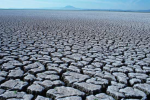
The United Nations Conference on Climate Change opened in Doha, Qatar on Monday, with representatives from almost 200 states gathering for the two week event to agree on commitments to cut greenhouse gas emissions. Ahead of the conference, NGOs and research institutions highlighted the pivotal role agriculture plays in international efforts to adapt to and mitigate the effects of climate change. The need to cut emissions from agriculture was confirmed by a recent CGIAR (Consultative Group on International Agricultural Research) study, which revealed that food systems contribute up to 29% of global greenhouse gas emissions, with agricultural production accounting for 80% of these emissions. Bruce Campbell, Head of the CGIAR Climate Change, Agriculture and Food Security research programme expressed concern that “agriculture is still considered a sideshow in the climate arena and a decision has been lacking over several years of UN climate negotiations”. Shefali Sharma from the Institute for Agriculture and Trade Policy (IATP) stressed that “if we truly want to address agriculture emissions, let’s start by setting targets for reducing nitrous oxides and methane from industrial farms and transitioning to agroecological practices”. Observers have expressed concerns over the lack of commitment by governments to make real progress in achieving a new global climate deal: “Most governments continue to support and advance the very policies that are driving the climate crisis, from dirty fossil fuel extraction of oil, gas and coal, to carbon trading, agrofuels and large-scale industrial agriculture”, said Sarah-Jayne Clifton from Friends of the Earth International. Agriculture will also be discussed at various side events at Doha, including a panel on Wednesday that will highlight the pitfalls of the concept of ‘climate-smart’ agriculture, and propose alternative approaches to tackling the climate and agriculture crises, while ensuring the right to food.
- Institute for Agriculture and Trade Policy: What's at stake for agriculture in COP 18?
- CIFOR Forests News Blog: Action on agriculture needed at upcoming U.N. climate talks
- Friends of the Earth International: UN Climate Talks: Urgent Progress Still Not in Sight
- Side Event: Agriculture in the Climate Talks and the Food Security Imperative
22.11.2012
Groundwater Depletion will affect Food Production, Scientists warn

In an article published in the journal ‘Nature Geoscience’ earlier this week, scientists have warned that the excessive extraction of groundwater for agricultural irrigation is one of the main reasons for the decline in groundwater levels. At a global level, groundwater depletion contributes to rising sea levels and a lack of water for food production. The authors concluded that the depletion is a frequent problem in large groundwater systems, both in semi-arid and humid regions. “Aquifers are reservoirs of enormous dimensions, but groundwater recharge is very slow”, said Professor Aeschbach-Hertig, Managing Director of the Heidelberg Center for the Environment and co-author of the article. The situation is extremely serious in dry areas with intensive farming, such as parts of India, China and the United States. Sustainable food production can only be achieved in these areas if groundwater levels are stabilised. In order to solve this problem, a transformation is needed in the way groundwater systems are valued, managed and characterised. Solutions must also be adapted to regional conditions. According to the authors, strategies such as water diversion and artificial groundwater recharge cannot compensate excessive extraction. “Purely technical approaches have not been successful. We must introduce more comprehensive economical, political and legal measures”, explained Professor Aeschbach-Hertig.

